Fiona Cahill 29 June 2023 · My beautiful brave mother
Fiona Cahill
My beautiful brave mother
Unmarried mothers' repatriations: 'I should never have been in Ireland'
'She must have loved me so much'
I have been in contact with Maria and her daughter Fiona for six months, talking to them about their efforts to find out missing details about Maria's early years.
After almost seven decades it is obvious Maria feels a massive sense of loss for the woman from whom she was permanently separated when she was aged only two.
Pictures of Philomena are prominent in Maria's living room.
"She must have loved me so much," said Maria as she mused on a treasured photograph which shows her on Philomena's knee at an institution for unmarried mothers in Castlepollard, County Westmeath.
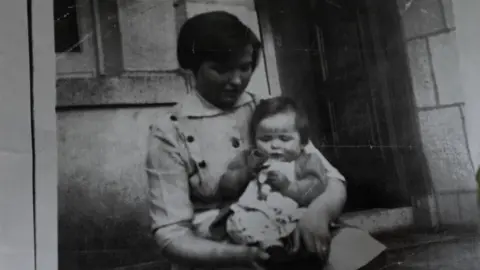 Maria Cahill
Maria Cahill
Maria and Philomena, pictured at an institution for unmarried mothers in Ireland, were separated in the mid-1950s
Advertisement
Philomena Cahill was 19 when she gave birth to Maria in Hendon in 1954.
She had moved to the English capital to work in a cigarette factory.
While she was in the city she met Maria's father.
Maria has spent 40 years compiling documents, trying to solve the mysteries of her childhood.
In recent times Fiona has largely taken over the process of letter-writing and making requests for documents under the Freedom of Information Act.
Advertisement
They have ring binders bulging with plastic wallets containing the correspondence and records they have obtained.
One letter says that in January 1954 - two months before Maria's birth - a priest called Father Craven "referred" Philomena to an organisation known as the Westminster Social Welfare Committee.
It was "run under the auspices of the Crusade of Rescue", which was one of the key organisations involved in the repatriation scheme.
'They took my mother's name away'
A baptism certificate shows Maria was christened at a church in London on 27 April 1954, a month after her birth.
The next record in the sequence is from the ledger book at Castlepollard mother-and-baby home in County Westmeath, where Philomena and Maria arrived in May 1954.
Advertisement
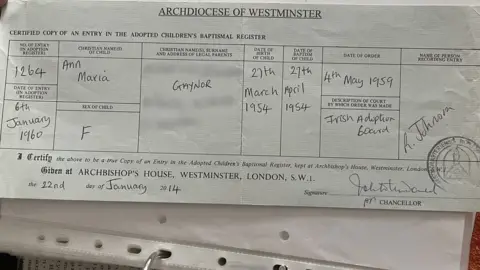
Maria's name and details are recorded in the baptismal register in London
Philomena spent two years there - which, at the time, was the standard period for the so-called "moral rehabilitation" of unmarried mothers who were labelled as "first offenders".
Maria said: "They took my mother's name away because she was a 'bad girl' - and called her Cyril."
The ledger records "Cyril" as being Philomena's "house name", which the women and girls in the institution were to be known as during their time there.
Philomena and Maria saw each other for the last time in 1956.
Advertisement
Maria recounted how the woman who adopted her in Ireland was emotionally abusive: "I grew up so lonely."
In later life Maria and Philomena coincidentally lived in Edinburgh at the same time, unknown to each other.
"I could have met my mum," said Maria. "I feel I was taken out of her hands - I was cheated."
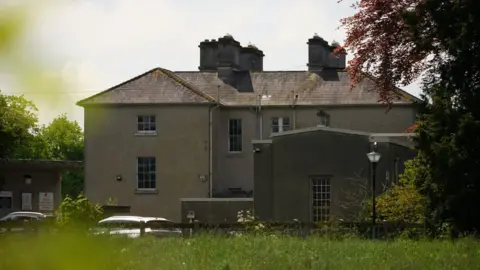
Maria and her mother were taken to Castlepollard mother-and-baby home in County Westmeath
The difficulties Maria faced in finding out about her past are shown by the fact she has a UK birth certificate, recording Philomena as her mother - and an Irish birth certificate, on which her adoptive parents are listed as her mother and father.
Advertisement
Maria only learned Philomena's identity after Philomena died.
She discovered she had half-siblings and that Philomena had been looking for her too.
However Philomena had been led to believe that Maria had been adopted in Canada.
"I was a much-loved and wanted child," Maria said, adding: "Why didn't they tell her more about me?"
Catholic Church's influence in Ireland
During the 20th Century, the Catholic Church had huge power in Ireland and the country was more socially conservative than the UK.
Advertisement
Unmarried, pregnant women frequently left Ireland to avoid going into oppressive institutions, most often to Great Britain.
Since what is now the Republic of Ireland became independent from the UK in 1922, Irish emigrants to Britain have had almost all the rights of British citizens, including residence, healthcare and social security.
However archives show that British welfare authorities and charities often regarded unmarried Irish mothers as a burden on resources.
Dr Lorraine Grimes from Maynooth University, who has examined the files, explained: "The cost was very strongly emphasised.
"They were saying: 'We're taking in these women, housing them in our institutions, having to find homes for their children.'"
Advertisement
 Maria Cahill
Maria Cahill
Such were the numbers that a categorisation appeared in official documents - PFI, standing for pregnant from Ireland, a term which survivors find demeaning.
In Ireland the Catholic Church feared that children born to Irish women in England would be lost to the faith.
In 1931 representatives of the Dublin government and English Catholic welfare organisations met at the Irish High Commission in London.
The Irish state agreed to pay half the costs of repatriating mothers who had become pregnant in Ireland, and had no other children.
Advertisement
However there is evidence that some women were repatriated despite having settled in Great Britain for a considerable time.
For example, in 1967 the researcher Mary Frances Creegan recorded a case involving a woman who had moved to England at the age of eight but was sent back to Ireland when she became pregnant years later.
Dr Grimes said that while the repatriations were supposed to be optional, a number of mothers she had spoken to "felt it was completely forced - that they did not have a choice".
Several other academics have cited similar findings.
More questions about human rights and consent arise in stories like that of Maria Cahill, who was born in Great Britain but moved to another country as a baby.
Advertisement
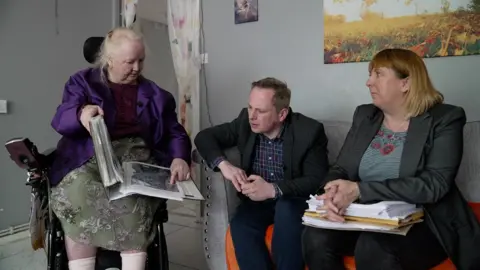
Maria and her daughter Fiona showed me photo albums and documents
Maria's daughter Fiona said there should be an official apology for what she described as an "anti-Irish, anti-single-mothers scheme".
"There'll never be a full sense of closure for my mum because she never had the reunion with her mother," said Fiona.
"But just to have the truth put out there and be told 'sorry' would mean so much."
Advertisement
The number of women and children involved in repatriations is difficult to ascertain.
The Catholic Protection and Rescue Society of Ireland (CPRSI)- which was one of the key organisations in Dublin - recorded that it facilitated the repatriations of 2,610 mothers between 1948 and 1971.
The highest yearly number of 213 occurred in 1967.
Government notes also indicate there were 195 CPRSI repatriations from 1938 to 1948.
But the overall scale is likely to be larger - firstly because of the lack of verifiable figures from the 1920s and most of the 1930s.
Advertisement
For instance, a welfare organisation in Liverpool docks reported contact with 1,947 pregnant Irish women from 1926 to 1930.
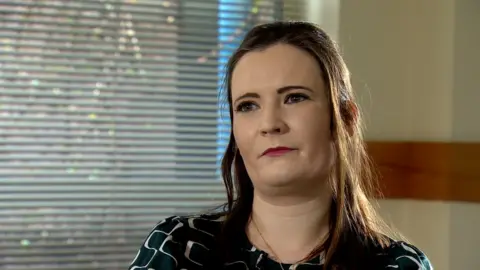
Dr Lorraine Grimes says some mothers she had spoken to felt their repatriation was forced even though it was supposed to be optional
It is not known how many were repatriated.
There are recorded instances of women being sent to Ireland from various other places, including Birmingham, Glasgow, Manchester and Portsmouth.
Also some repatriations were not documented at all.
Advertisement
Dr Grimes said: "There were informal, underground arrangements - through priests, through parents - that didn't feature in any official records."
The challenges in piecing together "fragmented" statistics is one reason why she feels there needs to be more research and the state "has to face into this institutional past".
"A lot of the survivors have passed away and others are pushing on in age. So it's important this happens now and we don't leave it for another decade."
The Irish government said it was "cognisant of the distress and deep hurt felt by many survivors that were repatriated".
It sent a lengthy statement to BBC News, setting out the work and findings of the Commission of Investigation into mother-and-baby homes, which published its final report in 2021.
Advertisement
The then Taoiseach (Irish Prime Minister) Micheál Martin apologised to survivors of the institutions, saying: "Each of you did nothing wrong and has nothing to be ashamed of."
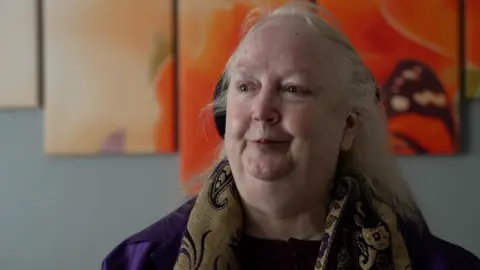
"My advice to women who are are going through this is to keep strong," says Maria
The government also said "comprehensive birth information and tracing services are now being delivered under recent legislation".
The Sisters of the Sacred Hearts of Jesus and Mary - who ran the Castlepollard institution - said they had no knowledge of or information on the matters we raised.
The organisation said it passed all of its files about mother-and-baby homes to the Irish health and social welfare authorities in 2009.
Advertisement
Several organisations in the UK, which have been named by researchers as being linked to repatriations, did not respond to requests for comment.
'Keep strong'
Maria has spoken about her experience in the hope she can help other survivors.
"My advice to women who are are going through this is to keep strong.
"There's always a paper trail.
"It might have taken me 40 years but eventually the bits and pieces about my life are coming together."
All reactions:
56
17 comments
16 shares
Like
Comment
Share
Most relevant
Sending love  Xxxx
Xxxx
Mike Stubbs
well done Fiona Cahill and Maria for doggedly bringing the research to some kind of fruition
2
Sarah Villeneau
I heard it. Well done. Heartbreaking.
Anji Rox
So important to share ' HerStory' for generations to come , thank you. Sending love to my Irish Sisterhood 
Anji Rox replied
·
5 replies
Louise O'Brien
Well done Maria and Fiona Cahill . Unimaginably hard for you 
Louise O'Brien replied
·
2 replies
Lora Hughes
You are all so awesome fighting this out xxxxx
Lora Hughes

Phil Scraton
Excellent Maria and Fiona ... with love and in solidarity, Phil x
Fiona Cahill replied
·
1 reply
Lisa Burridge
Sending you both so much love and strength.
